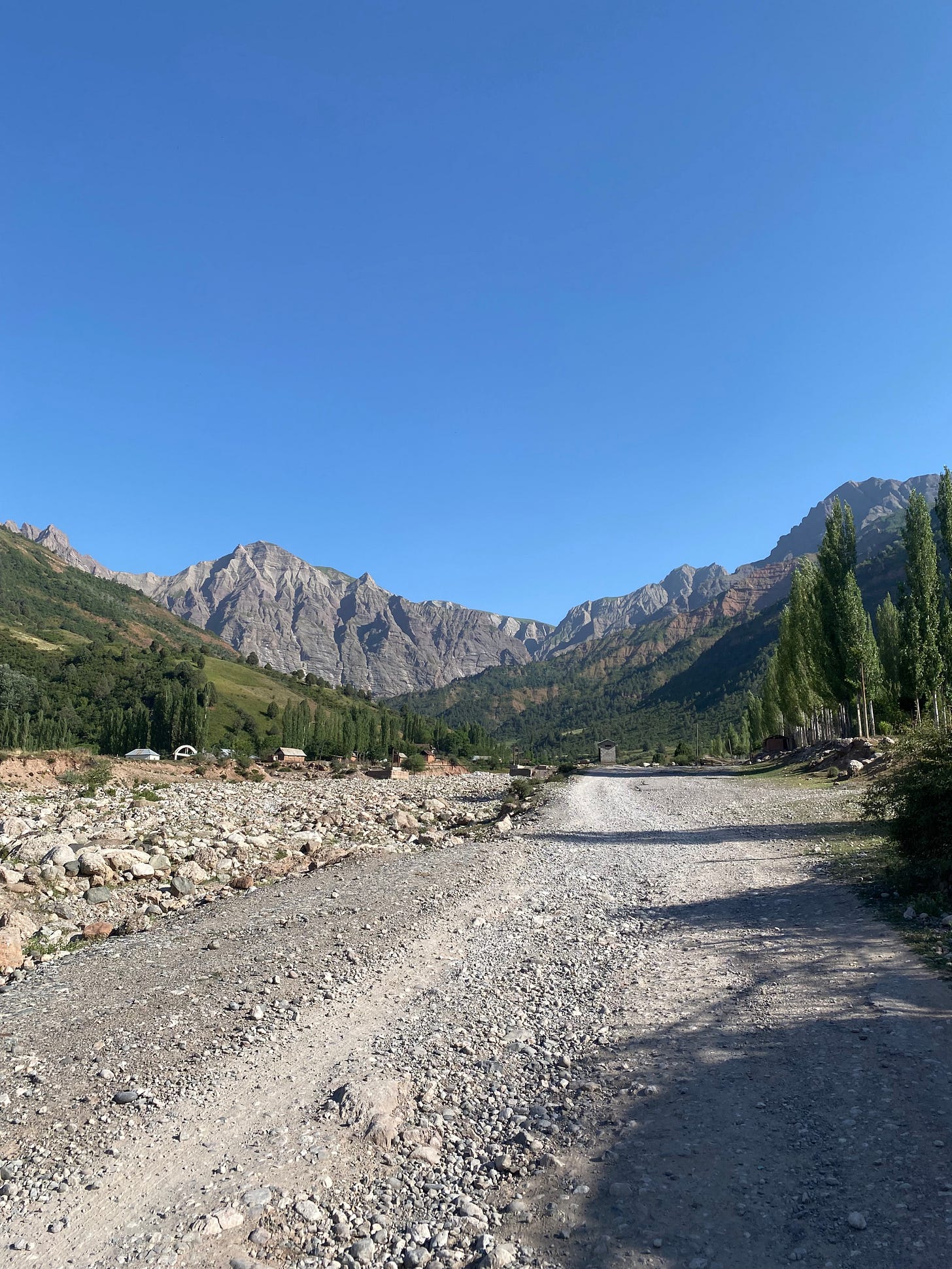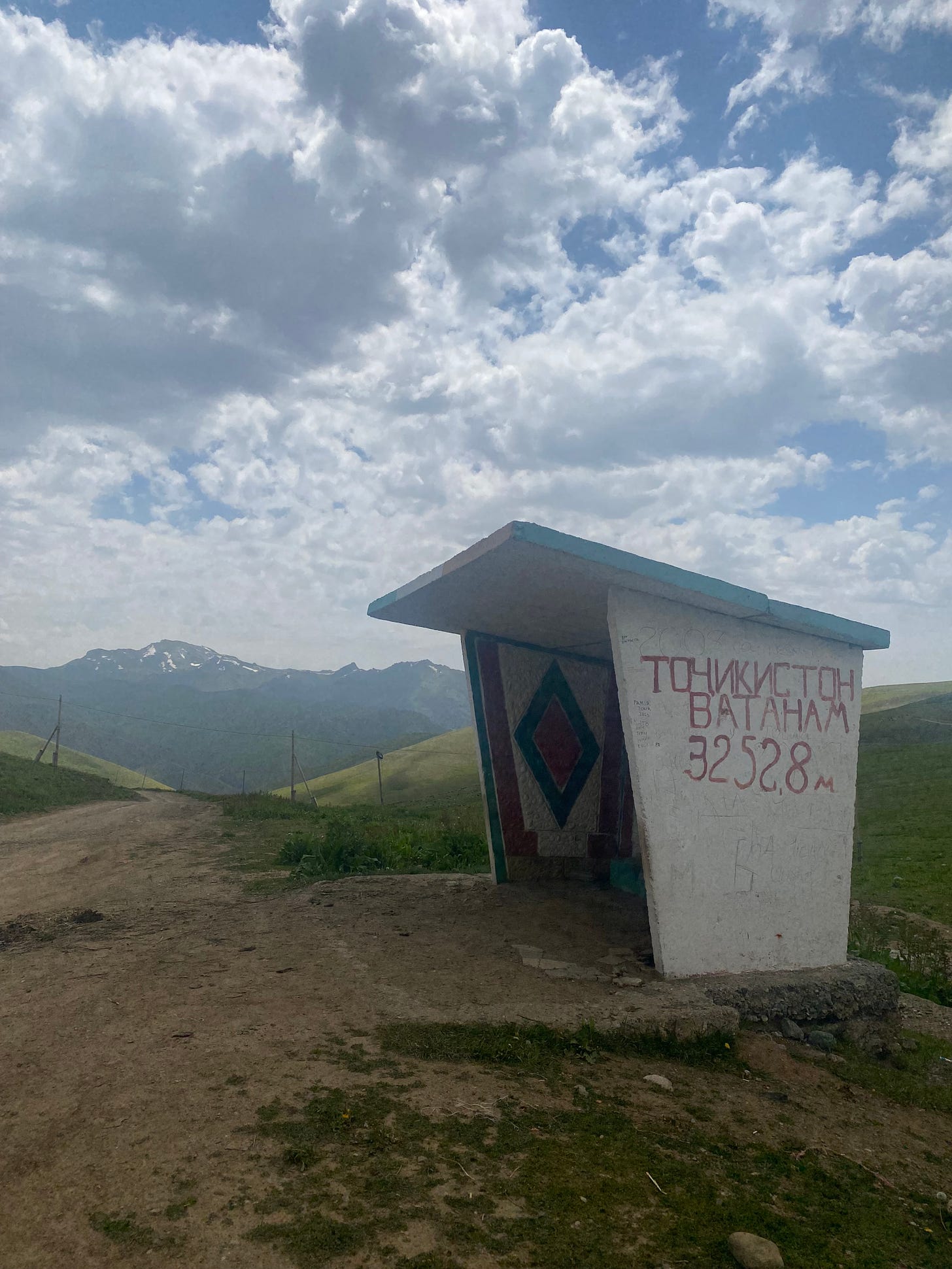I feel ready to escape the unforgiving heat of the city, and the dense smells of clogged exhausts, which hang in the air, then settle on my skin. The dirt is intrusive and unwelcome. Sickness has emptied me of energy, but also reset my spirits, and I can look beyond the disorder of the first few days. I want to find the satisfying rhythm of cycling day after day.
I begin by collecting cash from the one ATM that services Mastercard. It’s an unfamiliar weight in the pocket, which I hope will last my three weeks in Tajikistan. I’m told it may be hard to get more until Kyrgyzstan, and this inaccessibility is exciting: without contactless I have a finite resource, which must be allocated with thought, and each indulgence considered.
The first snack is free - I am given a watermelon after two hours of cycling. I can’t find the effort to eat it with delicacy and I’m quickly covered in sweet juices that dry and become sticky. I lie horizontally beneath the shade of a canvas cover and close my eyes.
When I wake there are several people huddled around my bike. They are only curious, and all very friendly, but I don’t enjoy the attention. One of the main appeals of travel by bike is the ability to remain inconspicuous, to drift through places unnoticed. This invisibility seems less possible here, where the bike - a garish shade of blue - and the professional looking equipment, stands out. It’s not the first time I have resented my unconscious journey towards meeting the marketing standards of the cycling industry.
I can console myself with the fact that I’ve chosen to wear loose-fitting shorts over lycra, and my evening outfit, a pair of three-quarter length shorts, resembles local trends. Both help to make me feel less obnoxious when I arrive in new places. And anyway - over time - a bikepacking outfit worn with the right spirit begins to see the effects of the kilometres it has covered. In this phase, as hygiene is deprioritised, normal life can be declared a long-forgotten memory.
On the second night out of the city I feel this moment is near. I have turned off the main road and shown my passport at the first military checkpoint. It’s another 250km of rubble road before Afghanistan is visible, and I’ll reach the Tajiki town of Qalai-Khumb. There is very little on the map and the evening light is fading.
These moments are toxic: the uncertainty is unsettling, but I have this split-second image of everything that is possible, this degree of vulnerability conjures an endless amount of scenarios that could happen. I am out of my comfort zone, in fact, well beyond it, and there is a temptation to go further.
When I reach a small village - no more than three or four houses - I see an old lady doing some front garden maintenance. I approach her and, separated by some fencing, make the universal request for sleep, putting my palms together and holding them to my ear. She clicks to get the attention of a small boy, no older than four, and signals that I should follow him. He leads me through a gate into the open space of a dusty courtyard, where the focal point is a tree that shades a cushioned seating area. There is a younger woman, his mother, pouring tea and she welcomes me over. In this moment, I immediately diffuse the last remaining bit of determination that I had reserved for any more unexpected challenges that evening. Relaxation washes over me, my body aches instantly, and my eyelids are heavy. I lean into these mellow feelings over a bowl of chal (a sour yogurt) and a plate of plov, and enjoy the reassurance of my surroundings.
The following morning breakfast is bread and homemade honey, a thick paste of sweetness that almost burns the tongue. I don’t want to leave, but the sun is already at a commanding height, and the heat is intimidating. The height of the valley keeps me out of direct light until the road opens up , and once again there is traffic accelerating around me, kicking up dust so that visibility is restricted to a few metres of loose rocks. On several occasions I pull over to avoid the on-coming cars.
I have been using IOverlander, an open source app where amenities - camping locations, water sources, shops - are marked. It is especially helpful as it runs offline and I haven’t had internet service for forty-eight hours. In Tavildara I stop at the hotel marked at the top of the town. It is an old Soviet square of a building, and I suspect it has been here as long as the other tarmac roads and roundabouts have existed. Inside, orders are taken through a hole in the wall to the kitchen and the menu is small: meat soup with potatoes, bread and chai. I’m getting quite used to separating the idea of appetising food and appetite.
It is the last thing I eat until 9pm in the evening. My next meal is taken in a village, under the roof of a building attached to the local mosque. It is 60 Tajik Somoni (£4.50) for the night, with dinner and breakfast included. I’m quickly learning that one of the joys of these arrangements are that there are no decisions involved in mealtime : you do not choose what you eat, and you do not choose when it will arrive. Eventually, as the podcast self-timer approaches sleep mode, a young man brings a tray to the entrance of the room where I’m lying. It is a pile of food and my stomach flips at the thought of digesting it without issue - but - I am grateful that another window of hunger will be resolved, without the need to begin a new packet of French style butter biscuits.
The philosophy of enjoyment is exercised once more the next morning and I take a lift to the top of the pass (3252m) to avoid another day of pushing; I want to ride my bike and the descent on the other side is too spectacular to be done with tiredness. The top of the pass is entirely different to the dusty valleys of the previous days - the view ranges from green plains nearby, dotted with sheep and yurts, to the overbearing mountains behind, which are covered in snow and appear to be in a different season to the one I inhabit.
It is 25km downhill before the next military checkpoint. Young soldiers are sleeping topless, or moping around with dated weapons slung across their shoulders. The process for administering beaucracy is to write my name in a thick booklet with a biro pen. I cannot help but feel the soldiers forgot why they bother a long time ago.
I soon arrive in Qalai-Khumb and with the shops, restaurants and accommodation options that are suddenly available, I become aware of the isolation I’ve experienced in the past four days. I have to recall if I’ve spoken English in the entire time, which I haven’t, and my phone is very quickly in a state of satelite flux, catching up on a few days of missed signals. I am carrying a tracker, but still - with less than 50 metres of river seperating me from Taliban controlled Afghanistan - it is good to check in with loved ones.
I have made contact with a Tajik lady called Nafisa, and her husband, Shakar. I have been connected by a lady from my village in the UK, who worked and travelled extensively in the region for almost fifteen years. She has kindly reached out to some old colleagues and now my contact list is a little richer with local knowledge. Nafisa has recommended a guesthouse and it is there that, by chance, I meet a maths teacher from Switzerland called Bruno. I’m not to know, but I’ll soon discover he possesses all the logic and calmness that one can desire in company when setting off into the Whakan Corridor and onto the Pamir Plateau.







